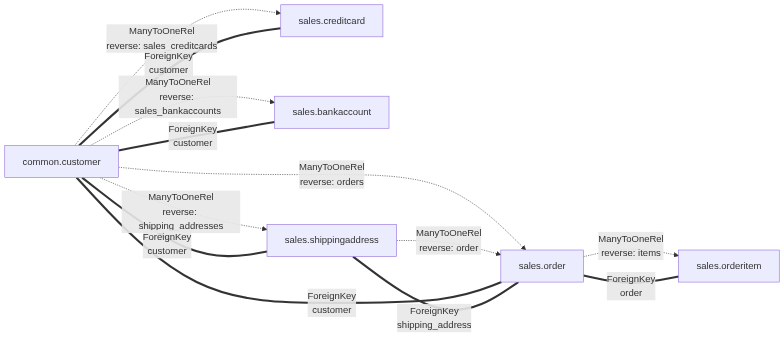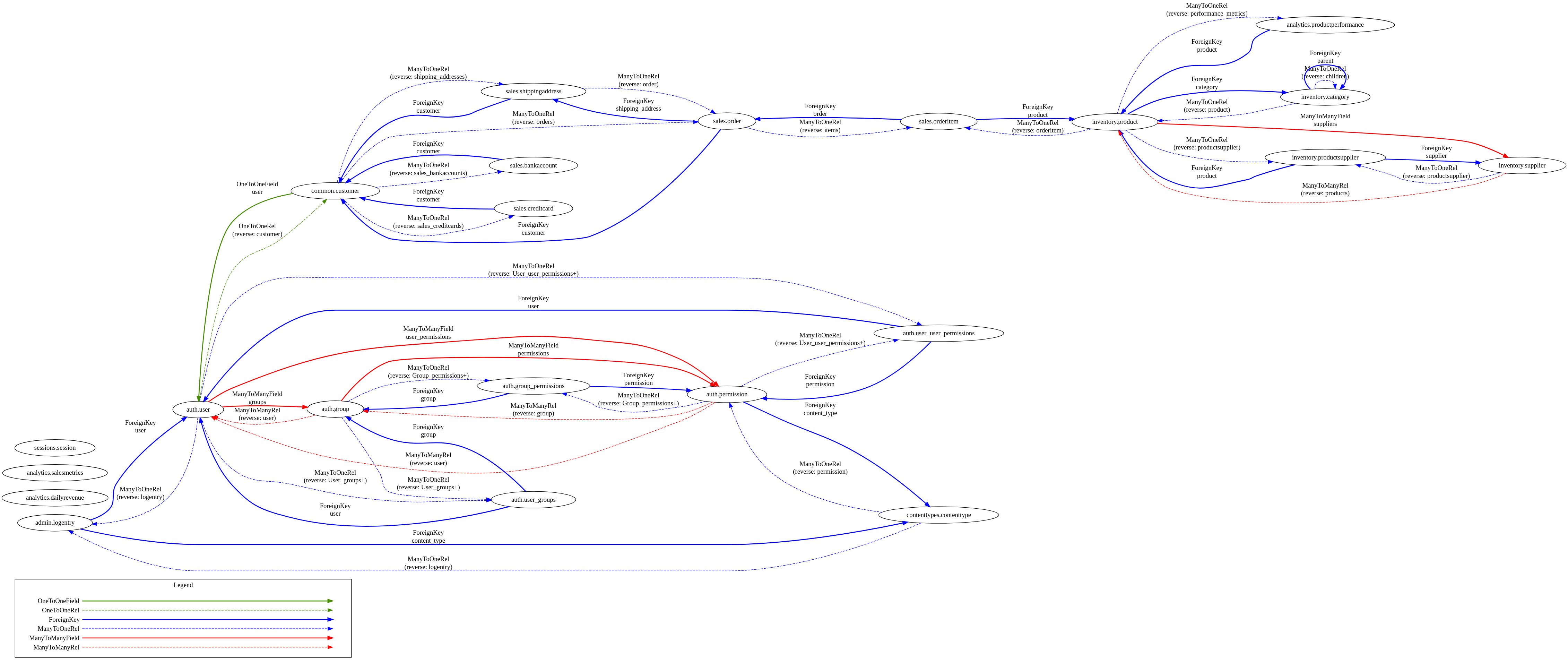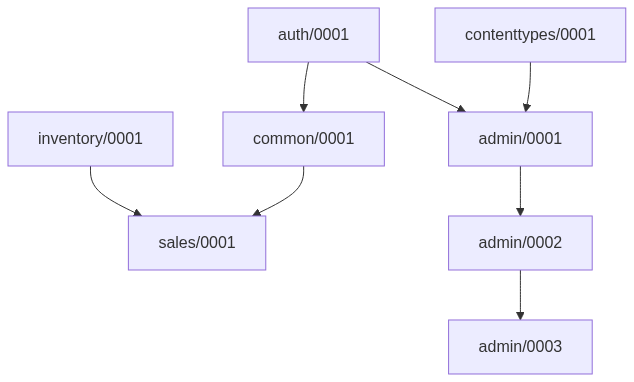Instantly understand your Django models' structure and relationships with beautiful, intuitive output.
Working with complex Django projects? Need to quickly understand model relationships and fields? django-model-info is an ideal solution for diving into any Django codebase with confidence.
Four django management commands provide detailed information about your models, relationships, and migrations:
- Perfect for New Team Members: Quickly understand existing codebases without diving through multiple files.
- Great for Documentation: Export beautiful HTML or Markdown documentation of your models' structure and relationships.
- Ideal for Large Projects: Filter by app or model to focus on what matters.
- Time-Saving: Instantly see model-related information without writing custom scripts.
- Useful Output: Leverages tools like rich, Markdown, MermaidJS, and Graphviz for beautiful output.
- Install the package:
pip install django-model-info- Add to INSTALLED_APPS:
INSTALLED_APPS = (
...
'django_model_info.apps.DjangoModelInfoConfig',
...
)You now have access to four new management commands:
modelinfo: Display detailed information about your modelsmodelgraph: Generate a graph of your models and their relationshipsmodelfilters: Understand how to filter queries for complex Django model relationshipsmigrationgraph: Visualize and understand the dependencies between migrations
python manage.py modelinfo sales -v 3 -o modelinfo.htmlpython manage.py modelinfo sales -v 3 -o modelinfo.mdpython manage.py modelfilters sales --target-model Customer ShippingAddress --target-field-type CharField -o modelfilters.htmlpython manage.py modelfilters sales --target-model Customer ShippingAddress --target-field-type CharField -o modelfilters.mdpython manage.py modelgraphOutput:
Model Graph Analysis
===================
Basic Statistics:
Models: 5
Relationships: 4
Isolated Models:
- sales.bankaccount
- sales.creditcard
Model Relationships:
sales.order:
← sales.orderitem
ManyToOneRel (reverse: items)
→ sales.shippingaddress
ForeignKey (shipping_address)
sales.orderitem:
→ sales.order
ForeignKey (order)
sales.shippingaddress:
← sales.order
ManyToOneRel (reverse: order)
python manage.py modelgraph sales -f mermaidResult:
```mermaid
graph LR
common_customer-. "ManyToOneRel<br>reverse: sales_creditcards" .->sales_creditcard
common_customer["common.customer"]
sales_creditcard["sales.creditcard"]
common_customer-. "ManyToOneRel<br>reverse: sales_bankaccounts" .->sales_bankaccount
common_customer["common.customer"]
sales_bankaccount["sales.bankaccount"]
common_customer-. "ManyToOneRel<br>reverse: shipping_addresses" .->sales_shippingaddress
common_customer["common.customer"]
sales_shippingaddress["sales.shippingaddress"]
common_customer-. "ManyToOneRel<br>reverse: orders" .->sales_order
common_customer["common.customer"]
sales_order["sales.order"]
sales_bankaccount== "ForeignKey<br>customer" ===common_customer
sales_bankaccount["sales.bankaccount"]
common_customer["common.customer"]
sales_creditcard== "ForeignKey<br>customer" ===common_customer
sales_creditcard["sales.creditcard"]
common_customer["common.customer"]
sales_order-. "ManyToOneRel<br>reverse: items" .->sales_orderitem
sales_order["sales.order"]
sales_orderitem["sales.orderitem"]
sales_order== "ForeignKey<br>customer" ===common_customer
sales_order["sales.order"]
common_customer["common.customer"]
sales_order== "ForeignKey<br>shipping_address" ===sales_shippingaddress
sales_order["sales.order"]
sales_shippingaddress["sales.shippingaddress"]
sales_orderitem== "ForeignKey<br>order" ===sales_order
sales_orderitem["sales.orderitem"]
sales_order["sales.order"]
sales_shippingaddress-. "ManyToOneRel<br>reverse: order" .->sales_order
sales_shippingaddress["sales.shippingaddress"]
sales_order["sales.order"]
sales_shippingaddress== "ForeignKey<br>customer" ===common_customer
sales_shippingaddress["sales.shippingaddress"]
common_customer["common.customer"]
```
python manage.py modelgraph -f dot -o modelgraph.dotpython manage.py migrationgraph common sales inventory adminOutput:
[common]
common/0001_initial
Depends on:
auth/0001_initial
Depended upon by:
sales/0001_initial
[sales]
sales/0001_initial
Depends on:
common/0001_initial
inventory/0001_initial
[inventory]
inventory/0001_initial
Depended upon by:
sales/0001_initial
[admin]
admin/0001_initial
Depends on:
auth/0001_initial
contenttypes/0001_initial
Depended upon by:
admin/0002_logentry_remove_auto_add
admin/0002_logentry_remove_auto_add
Depended upon by:
admin/0003_logentry_add_action_flag_choices
admin/0003_logentry_add_action_flag_choices
_____________________
Migrations Flowchart:
```mermaid
graph TD
sales_0001_initial["sales/0001"]
inventory_0001_initial["inventory/0001"]
auth_0001_initial["auth/0001"]
contenttypes_0001_initial["contenttypes/0001"]
common_0001_initial["common/0001"]
admin_0001_initial["admin/0001"]
admin_0002_logentry_remove_auto_add["admin/0002"]
admin_0003_logentry_add_action_flag_choices["admin/0003"]
admin_0001_initial --> admin_0002_logentry_remove_auto_add
admin_0002_logentry_remove_auto_add --> admin_0003_logentry_add_action_flag_choices
inventory_0001_initial --> sales_0001_initial
auth_0001_initial --> admin_0001_initial
common_0001_initial --> sales_0001_initial
contenttypes_0001_initial --> admin_0001_initial
auth_0001_initial --> common_0001_initial
```
For detailed usage and examples, visit our full documentation.
- List manager and queryset methods
- Include signals and other model-level methods
- Add MermaidJS support for visualizing relationships
We welcome contributions! This project uses:
The modelinfo command has been something I have slowly been working on and improving for several years. The original idea behind modelfilters came from observing the underlying functionality in the django-drip-campaigns package and realizing that having a way to list potential filter paths could help developers with building complex queries, though my implementation of those ideas is quite different. The modelgraph command was loosely inspired by existing tools like the graph_models command in django-extensions, but I wanted to provide a more detailed, filterable, and customizable output. The migrationgraph command was inspired by recent discussions I read online about migration graphs and dependencies, but I cannot recall the specific thread/post that sparked the idea.
MIT License


